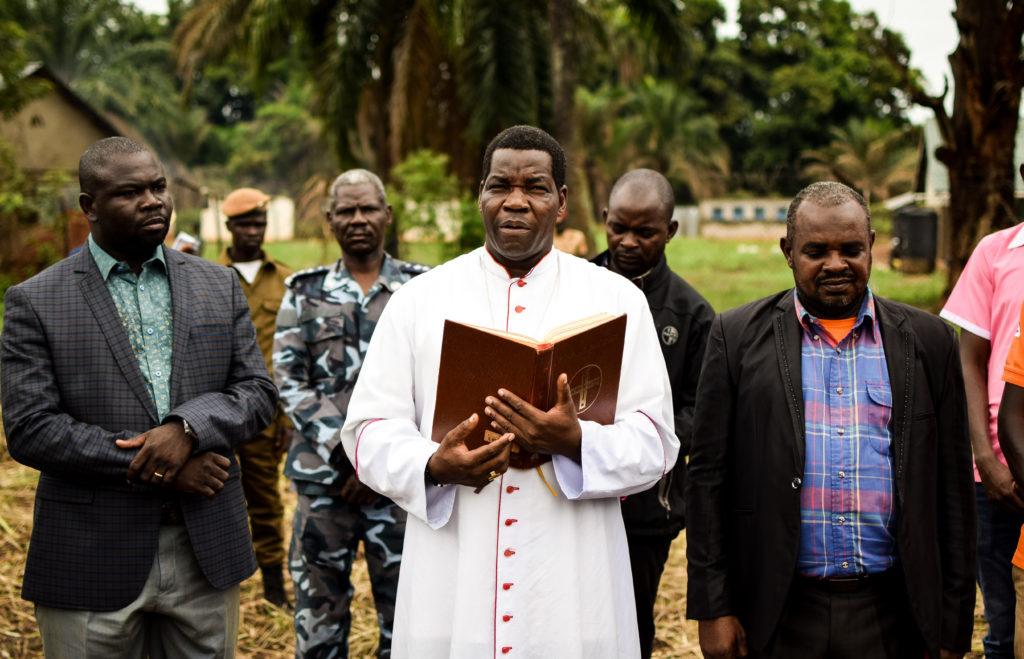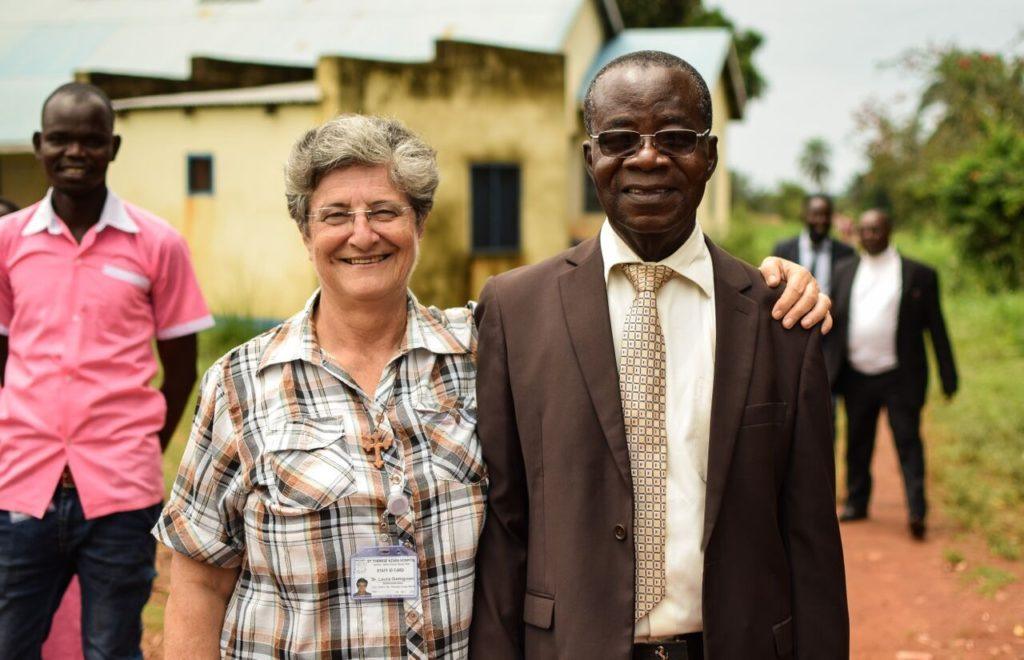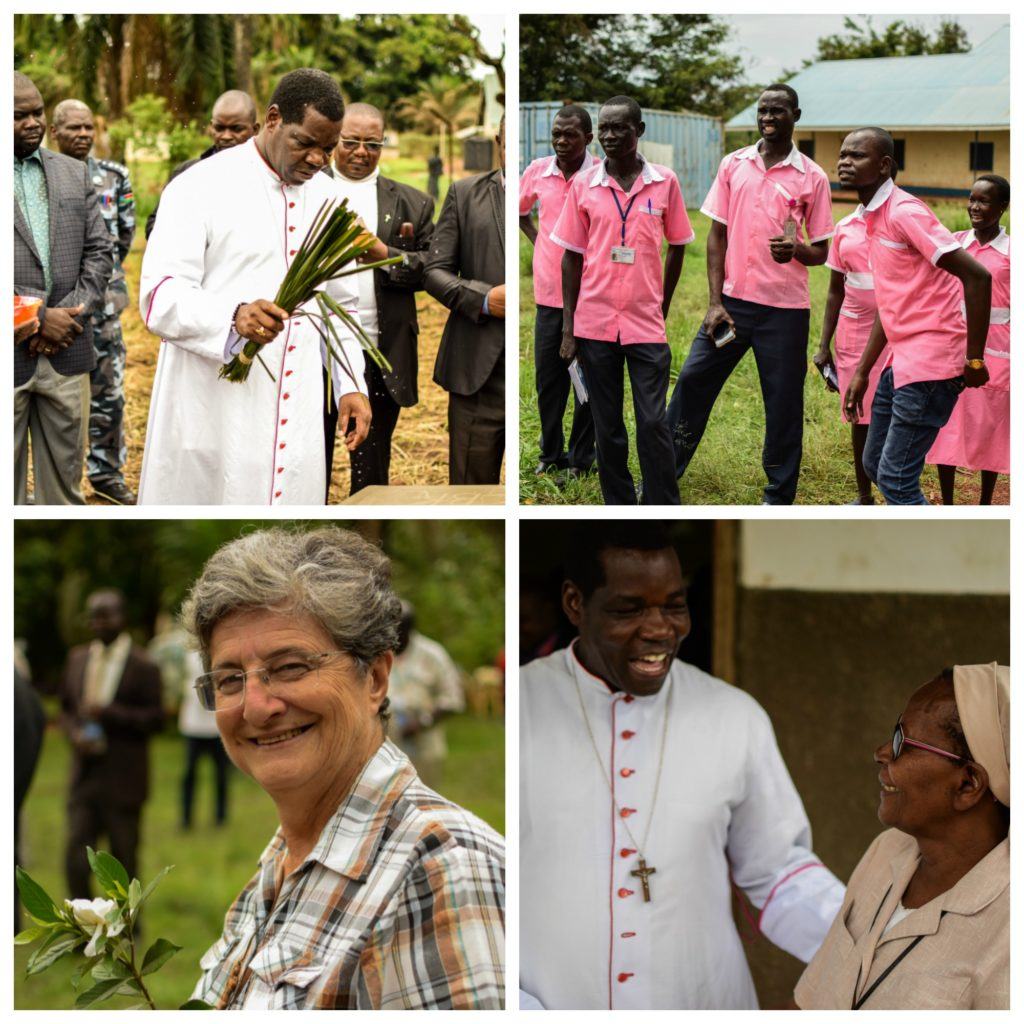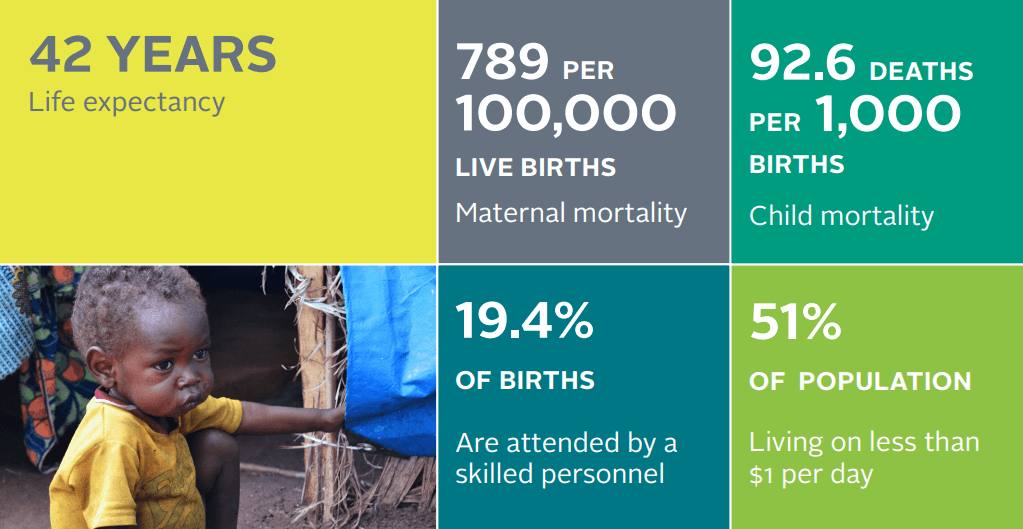New Surgical Unit and Blood Bank in South Sudan
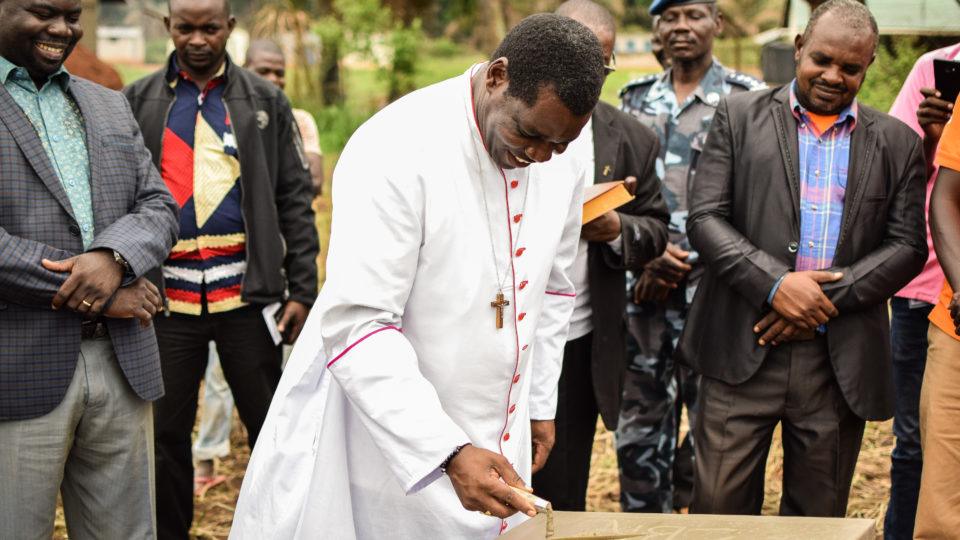
On April 7th, 2018, a partnership between CMMB South Sudan, Diocese of Tambura/Yambio, Comboni Missionary Sisters, Edmund Rice Foundation Australia, Sudan Relief Fund, Aurora Prize, Loyola Foundation, Sisters of Charity Incarnate Word, and Kenda Onlus, celebrated the laying of the first brick, launching construction of a much-needed operating theater, maternity ward, and blood bank at the St. Theresa Hospital in Nzara, South Sudan.
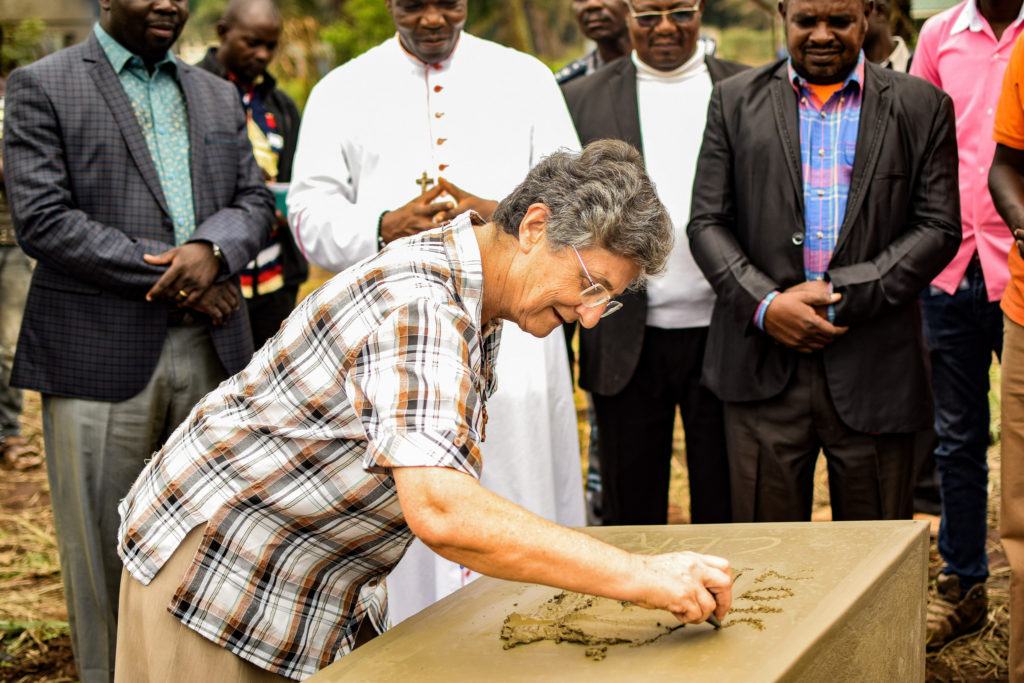
Sister Laura is the hospital administrator at St. Theresa Hospital. She marks the date of the ground breaking on the ceremonial first brick.
The ceremony was presided over by Bishop Eduardo Hiiboro Kussala, the Catholic bishop of Tombura-Yambio diocese in South Sudan. Also in attendance – Honorable Governor Daniel Badagbu Rimbasa, Hononorable Hussein Enocka, Minister, State Ministry of Health, Gbudue State, Honorable Elia Box Richard, Commissioner of Nzara County, and Vicar General, Father Anthony Bangoye.
CMMB has made history today. – Bishop Eduardo Hiiboro Kussala
Increasing Access to Quality Care at St. Theresa Hospital
St. Theresa Hospital is owned by the Diocese of Tambura/Yambio and operated by the Comboni Sisters. The hospital provides health services to Western Equatoria State and surrounding countries, including Democratic Republic of the Congo and the Central African Republic. The hospital catchment area is approximately 300,000 people.
The lack of proper surgical capacity at the hospital leads to major challenges for patients who are critically ill, including pregnant women who face complications. The distance and challenge to reach the nearest hospital with surgical care often means the difference between life and death.
When I think about what we are doing with this hospital and with this operating theater, it’s part of a broader context of sharing solidarity with the people and creating a safe and healthy environment in which people can thrive. – Robert Wuillamey, Director of Partnerships
The project aims to remedy these deficiencies and expand capacity at the hospital to more fully meet its mandate to provide quality health services to all those who seek them. It will include the construction of a surgical wing, with an operating theater, a surgical recovery ward, a maternity ward, and a blood bank, where voluntary blood donation, screening, and storage will occur.
It is estimated that once complete, this building project will benefit more than 17,000 patients annually in Nzara County and surrounding areas. It will be especially important for the most vulnerable, including pregnant women, newborns, and children.
The goal of this project is to strengthen the local health system to meet the surgical needs of the community, with emphasis on pregnant women.
The main objectives, outcomes, and activities:
- Reduce morbidity and mortality through improved access to quality health services at St. Theresa Hospital in Nzara.
- Build and equip a surgical unit, including a blood bank, in St. Theresa Hospital.
- Develop staffing and technical capacity for the new unit.
- Create awareness and care seeking at the new unit for related health needs.
The proposed project will address three major needs:
- The need to strengthen the local health system in Nzara County by improving access to quality surgical services for the general population, and advanced obstetric services for pregnant women.
- The need for a consistent and trustworthy supply of blood to support activities at the operating theater and for other health issues requiring blood transfusions.
- The need for additional recovery wards to support the increase demand created by greater access to maternal and surgical services.
New Infrastructure will Support our CHAMPS Initiative in South Sudan
Expanded services will ultimately support CMMB’s Children and Mothers Partnerships (CHAMPS) initiative. CHAMPS is CMMB’s long-term commitment to improving the health of women and children in targeted geographic areas based on extreme need. Partnering with local communities, CMMB is transforming the lives of some of the world’s most vulnerable women and children by tackling the deep-rooted causes of morbidity and mortality. Through CHAMPS, and working with public and private partners, we are providing life-saving medical care for pregnant women and newborns, and fighting disease and poverty. We work to ensure that our partnering health facilities are adequately equipped and properly staffed with trained health professionals to meet the needs of the community it serves.
St. Theresa Hospital serves as the clinical site for our South Sudan CHAMPS and houses our Safe Motherhood program – which aims to reduce the rate of mortality among pregnant women by providing pre-and-postnatal services and safe, facility deliveries. Access to a well-equipped operating theater and maternity ward are essential to the implementation of the Safe Motherhood project.
Video created by our volunteer: Dr. Matthew Jones:
A Brief History: South Sudan
For decades, the people of South Sudan have suffered from poor healthcare and health outcomes. Many of these problems stem from the protracted liberation war in Southern Sudan (1955-2005) prior to its independence, which destroyed much of the country’s physical and social infrastructure, and led to the displacement of over four million people, as well as an estimated 1.5 million deaths. After the country’s independence in 2011, continued unrest, including outbreaks of civil war in 2013 and 2016, as well as attacks by warlord Joseph Kony’s Lord’s Resistance Army, led to further deterioration of the health system.
These conflicts have left a very deep and dark legacy, which is reflected in various disturbing statistics. More than half of the population lives on less than US$1 per day, with the majority of the people engaged in rural subsistence farming and cattle herding. More than half of the population has difficulty accessing potable drinking water, over 93 percent do not have access to proper sanitation (less than 7%) and most of the adult population are illiterate (88% among women and 63% among men).
The country has some of the worst health indicators in the world, with an average life expectancy of just 55 years. It has one of the highest Maternal Mortality Rates (MMR) in the world, at 789 deaths per 100,000 live births. More than 80 percent of mothers deliver at home, the majority with traditional birth attendants. This is due to the shortage of doctors, nurses, and health facilities, and the distances that people live from care.
There is a chronic lack of health infrastructure, as evidenced by various statistics. For example, in a country of roughly 12 million people, only three blood banks are officially recognized by South Sudan National Authorities, and all of them are effectively out of action. This is, in large part, due to ongoing violence, and poor transportation conditions, which makes accessing and distribution of blood for transfusion practically impossible. The extreme lack of blood banks is especially alarming as the need for blood transfusion is very high, particularly for children under five and pregnant women.
The Power of Our Partners
We love what we do, but we can’t do it alone.
There are several key partners, both local and international, who have joined together to make this project a reality:
The Diocese of Tambura/Yambio – The diocese is the owner of St. Theresa/Nzara Hospital. The diocese actively participated in the conceptualization and planning of the project and Bishop Eduardo Kussala endorsed and approved its implementation.
The Comboni Sisters – The Comboni Sisters manage and operate the hospital on behalf of the diocese. Sr. Laura Gemignani is the hospital’s chief administrator and has been instrumental in the overall conceptualization of the project and a key stakeholder in the design of the facilities. The Comboni Sisters will manage and maintain the new facilities as part of the hospital’s overall campus. The Sisters also provided funding for the project.
Edmund Rice Foundation Australia (ERFA) – ERFA, through Dr. Dan Doyle, has been instrumental in securing architectural design services for all four facilities and well as key funding for the project. Dr. Doyle serves as a key planning adviser and project facilitator.
Sudan Relief Fund (SRF) – SRF is a key funding partner for this project and participated in the January 2018 Partner Planning Meeting at St. Theresa/Nzara Hospital
Aurora Prize for Awakening Humanity (100 Lives Foundation) – The Aurora Prize is an initiative led by Vartan Gregorian, Ruben Vardanyan, and Noubar Afeyan, along with individuals of Armenian origin. The prize aims to celebrate those who helped Armenians in need one hundred years ago and to continue in their spirit by supporting people and organizations that keep the legacy of gratitude alive. They are key stakeholders in this project.
Loyola Foundation – Loyola supports Catholic mission in less developed countries around the world. They have partnered with CMMB on numerous projects, including this one.
Sisters of Charity of Incarnate Word – The Sisters are long time supporters of CMMB and advocates of our work in South Sudan. They are key stakeholders in the project.
Kenda Onlus – Kenda is a local Italian NGO with interest in advancing the development of a blood bank and a community-based blood donation program.
